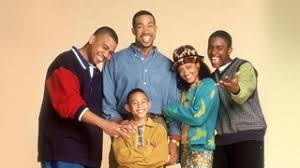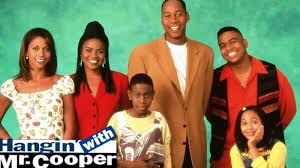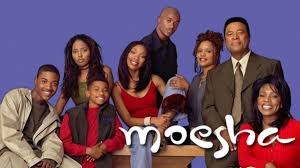
The Cosby Show premiered in 1984 on NBC and quickly became a staple in television history. The show featured comedian Bill Cosby and based a lot of its episodes on Cosby’s personal life. Although the show, a sitcom featuring the Huxtable family, a prominent black family living in Brooklyn, New York, reached its end in 1992, it influenced not only television, but also the view of the black family in the 90s. Millions of people looked up to Cliff and Clair Huxtable. This fictional family was the epitome of black success. The Huxtables had respectable professions (obstetrician and lawyer) and reared five obedient, for the most part, children. The show portrayed a view of the black family that was rarely seen on T.V., an entirely positive aesthetic.
TV Guide said the show “was TV’s biggest hit in the 1980s and almost single-handedly revived the sitcom genre.”[i] No truer words were spoken. The Cosby Show broke the mold and went on to spawn other popular black family sitcoms in the 90s such as, Family Matters and The Fresh Prince of Bel-Air. Both sitcoms featured loveable characters like Steve Urkle and Will Smith, but they also carried on the model of The Cosby Show. The families were middle to upper-middle class professionals, and the children had their faults, yet were, for the most part, model young adults. The children made mistakes, but learned from them. Both The Fresh Prince of Bel-Air and Family Matters proved to be positive influences of the black family in the 90s. The era of black consciousness made its mark on more than film, music, and literature. It permeated into mainstream television, too.


The New York Times credits The Fresh Prince of Bel-Air with putting rap on the map and reinforcing the themes in raps’ biggest songs of the 90s in a different way. “We will start to deal with some of the same things as N.W. A., Public Enemy, Ice Cube, and artists with a much more radical way of communicating their life style. But we’ll do it Will’s way, rather than in their language.”[ii] The show addressed issues that plagued the black community, such as racial profiling and vigilante justice. Audiences were entertained by Carlton’s naiveté, Hiliary’s spending habits, and Will’s jokes, but they were also enlightened. The world could look on and experience the era of black consciousness in an unassuming way.
The Big 3 of Black sitcoms opened the door for black families on television, and the 90s saw an explosion of representation of black families. Shows like Hanging with Mr. Cooper, Moesha, and Smart Guy featured families that weren’t technically nuclear. Hanging with Mr. Cooper and Smart Guy featured families with single parents raising children to the best of their abilities with the help of the community around them. Though the titular Mr. Cooper had no children, he acted as a father figure and friend to Nicole, the child of single mother, Georgia, and other kids in the neighborhood. Moesha and Smart Guy dealt the life after the death the family matriarch, and life after such a tragedy. These sitcoms presented different configurations of the Black family that were still positive and uplifting. 


However, after The Cosby Show, The Fresh Prince of Bel-Air, and Family Matter in 1998, the picture of the black family in America diminished. Television has evolved. Shows like Empire, Love and Hip Hop, Basketball Ball Wives, and The Real Housewives of (insert city) are the portrayals of black family seen today. The black family is seriously misrepresented. It is broken and dysfunctional at best. Black women on TV are unmarried and can’t find a man, and the men are untrustworthy players with multiple children. People can argue that “families” such as this exist in America, yet it’s not all that exists so it’s not all that should be portrayed (or the majority of what is portrayed). So what happened to empowering black women? Black men? Black children? The black family? Where’s the sense of black consciousness that infected the 90s? The Fresh Prince was raised by a single mother and barely knew his father, but he had a support system and family in uncle Phil, aunt Vivian, and his cousins. The show exposed the bad, but showed there can be good too.

With the black family’s downfall came the demise of the view of the ultimate black patriarch, Bill Cosby. Since 2000, Bill Cosby has faced sexual assault and abuse, rape, and drug allegations from over fifty women that he encountered before and during the pinnacle of his career. These allegations have rocked the black community and torn people apart, supporters and now naysayers of Cosby. During The Cosby Show’s reign, no one would have conceived that Bill Cosby, Mr. Huxtable, loveable father and doting husband would fall from grace. Yet, he has. No matter what one chooses to believe about him, he has fallen, hard. The beginning of Cosby’s assault allegations coincides with the end of the black family on TV.
The end of an era.
Symbolic or coincidental?
Both. ––B. Stewart
[i] “The Cosby Show.” TVGuide.com. CBS Interactive, Inc., 2015. Web. 28 Nov. 2015.
[ii] Rohter, Larry. “‘Fresh Prince of Bel Air’ Puts Rap in Mainstream.” The New York Times. The New York Times, 16 Sept. 1990. Web. 28 Nov. 2015.